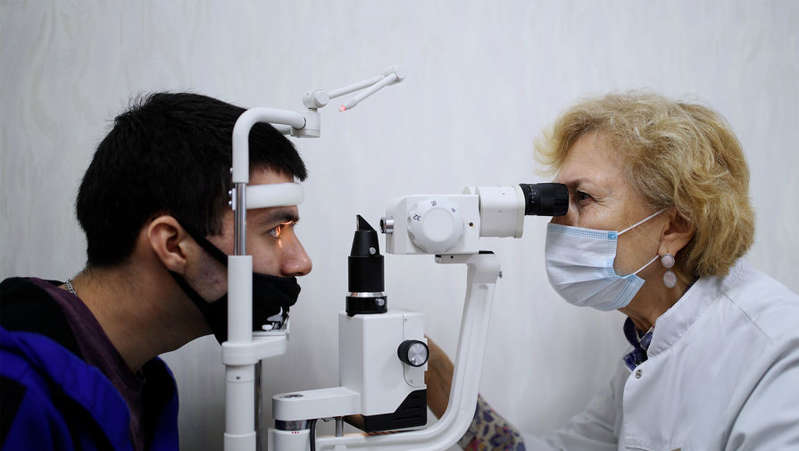Ophthalmologist urged patients with coronavirus to monitor visual acuity
Coronavirus can not only provoke eye diseases, but also cause complete blindness. Neuro-ophthalmologist Natalya Voroshilova told Gazeta.Ru about this.
“Coronavirus causes damage to retinal ganglion cells and pigment epithelium. These are important structures in the retina. It consists of 10 layers and each of them is critical. The ganglion layer and the pigment epithelium are involved in the perception of the visual impulse and its transmission further into the cortex of the visual analyzer.
The most common causes of decreased vision after coronavirus are retinal vascular thrombosis. They can lead to atrophy of the eye nerves, loss of visual fields and blindness, ”the specialist explained.
The ophthalmologist of the highest category, professor, doctor of medical sciences Tatyana Shilova agrees with her. The eyes are the gateway to the coronavirus, she said.
“SARS-CoV-2 penetrates the ocular surface and infects the body as a whole – thus, 5-7% of people get sick. The course of coronavirus infection itself is accompanied by changes in the coagulation system and often leads to vascular catastrophes inside the eye: thrombosis, ischemic conditions appear, blood circulation inside the eye is impaired, and this can cause partial or complete blindness, “the physician added in an interview with Gazeta .Ru “.
Viral conjunctivitis, dry syndrome, or chronic eye disease can be aggravated to the general symptoms of COVID-19.
“I have had patients whose chronic eye diseases worsened after the coronavirus. For example, herpetic keratitis (infection of the cornea with the herpes simplex virus – Gazeta.Ru) has worsened, ”Voroshilova noted.
“Patients who had an initial form of cataract and the disease worsened as a result of coronavirus infection often turn to me,” Shilova added.
Ophthalmologist Natalya Ivankovskaya, in turn, added that blepharitis, which causes inflammation of the edges of the eyelids, is a frequent ophthalmological manifestation of COVID-19.
“Because of the coronavirus, inflammation begins, and almost any inflammation leads to visual impairment. This happens for various reasons. For example, an infection can cause swelling, a change in the structure of the lacrimal fluid and a spasm of the eye muscles, ”the interlocutor of Gazeta.Ru clarified.
At risk are those people who initially had eye problems, in particular, severe myopia, Voroshilova emphasized.
“Myopia below six diopters – such patients have a high risk of retinal dystrophy and glaucoma (a disease in which the optic nerve is damaged and visual functions are destroyed. -“ Gazeta.Ru ”). Also, because of the coronavirus, people with age-related macular degeneration (AMD, a disease that leads to a decrease in visual acuity due to damage to the central retina of the eye. – Gazeta.Ru) are at risk, “the ophthalmologist noted.
To protect the eyes of people who are already sick with COVID-19, it is necessary to periodically check their vision – to look into the distance separately with each eye, so that it can be determined whether there is a decrease in acuity in one of the eyes.
“If there was conjunctivitis during the coronavirus, then an artificial tear should be used for a long time to wet the eyes. If you know that you suffer from AMD, then it is imperative that you visit your attending physician and conduct control studies, ”explained Voroshilova.
For people with healthy eyes, the physician recommended in quarantine not to spend their free time only at a computer or phone.
“You should give your eyes a rest, as computer vision syndrome may occur, which is accompanied by a temporary deterioration in vision. It is worth taking breaks every four hours, ”the specialist concluded.
Earlier, German scientists from the Max Planck Institute for Biomolecular Medicine and the Wilhelm University of Westphalia found that coronavirus can have an extremely negative effect on vision. The research results are published in the online archive bioRxiv.
Scientists have exposed mature retinal organelles to the coronavirus. After that, they observed for some time the activity of the virus and the rate of its replication. The researchers concluded that the SARS-CoV-2 virus may infect and replicate in the photoreceptors and ganglion cells – neurons – of the retina, thus disrupting the transmission of impulses from the retina to the CNS.
They also noted that SARS-CoV-2 infection of retinal organelles causes a surge in interleukin 33, a cytokine (information molecule) associated with acute COVID-19 disease and possible retinal degeneration. Experts suggest that the increased expression of cytokines is a consequence of the body's immune response to infection with coronavirus.

